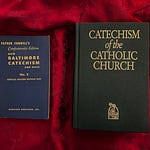
P. A. Ritzer, Volume 27
Please see all twelve parts of “The Big Lie of Overpopulation and the Fear that Drives It:” Part One: “One Big Family;” Part Two: “Truth Pierces the Veil of Propaganda;” Part Three: “Elon Musk, Bill Maher, Mark Steyn, Ronald Reagan, and Paul VI on Demography, Life, and Murder;” Part Four: “Nature, Control, and Sin;” Part Five: “Psychology, Communication, Love, Communion, and Sacrament (Not Necessarily in that Order);” Part Six: “Sexual Morality, Hope, and Healing;” Part Seven: “Compelling Observations about Human Procreation from Roseanne Barr, Tucker Carlson, and Calley and Casey Means;” Part Eight: “The Deep, Broad Root of the Culture of Death;” Part Nine: “In Vitro Fertilization and Transhumanism as Illuminated by Nicole Shanahan and Mattias Desmet;” Part Ten: “‘A Truly Human Civilization’ vs. the F-Word Culture;” Part Eleven: “Fear, Control, and Death;” and Part Twelve: “Making Room and the Courage to Love;” and please see also “The War on Women and Population Control.”
The Church affirmed that sexual intercourse is right and ordered and good between a man and a woman united in the Sacrament of Matrimony for the unity of the couple and the procreation and education of children. Humanae Vitae:
Married love particularly reveals its true nature and nobility when we realize that it takes its origin from God, who “is love,”(6) the Father “from whom every family in heaven and on earth is named.”(7)
Marriage, then, is far from being the effect of chance or the result of the blind evolution of natural forces. It is in reality the wise and provident institution of God the Creator, whose purpose was to effect in man His loving design. As a consequence, husband and wife, through that mutual gift of themselves, which is specific and exclusive to them alone, develop that union of two persons in which they perfect one another, cooperating with God in the generation and rearing of new lives. . . .
And if each of these essential qualities, the unitive and the procreative, is preserved, the use of marriage fully retains its sense of true mutual love and its ordination to the supreme responsibility of parenthood to which man is called.1
Contracepted sexual intercourse offends the nature of the act by closing it to its natural and supernatural ends of union and procreation. So, the elder Maher apparently objected to the Church’s affirmation that deliberatively contracepted sexual intercourse is wrong, and he left the Church for that. And this rebellion seems to have left a profound mark on his son, who has exhibited real hostility to religion—whether he considers himself atheist, agnostic, or “apathist”—in his rebellious-teenager way that insists on pitting science against religion rather than recognizing their natural harmony.
Sexual intercourse is designed to create other humans beings with supernatural destinies to live with God for all eternity and not to be the plaything that our culture has groomed us to believe it is.
The use of terms is interesting: contraception and birth control. Contraception, that is against conception, is used to control birth. Control. I have been long struck by the pride of humanity that one should be able to engage in sexual intercourse that is designed by nature and nature’s God for the purpose of reproduction and then expect to control birth by artificial means, playing with the natural order in human sexuality, let alone the spiritual. Humanae Vitae speaks to this:
But the most remarkable development of all is to be seen in man's stupendous progress in the domination and rational organization of the forces of nature to the point that he is endeavoring to extend this control over every aspect of his own life—over his body, over his mind and emotions, over his social life, and even over the laws that regulate the transmission of life.2
How prescient does that sound when we reflect on our present culture?
Control. It makes me think of a neighbor asking after we had our second child, if we were now “stopping.” Stopping? I knew what he meant, but I was so overwhelmed by the impropriety of his question—the very idea that we could just shut off, as with a switch, the divinely established procreative power of our marital union; that anything to do with the divinely established procreative power of our marital union was any of his business; that anyone would speak of such profound and private matters so casually; and thus that he would even ask such a question let alone expect an answer—that I almost answered, “Stopping? Do you mean sexual intercourse?” Do people have any idea what they are dealing with, what they are playing with, what they are trivializing, with ramifications cosmic and eternal? Sexual intercourse is designed to create other humans beings with supernatural destinies to live with God for all eternity and not to be the plaything that our culture has groomed us to believe it is.
It brings to mind another memorable conversation I had during my year in Italy with a young woman in the program who, like Tom mentioned above, was from California. Let’s call her Sheila. In my imperfect recollection, I believe Sheila was from San Francisco and apparently amiably excused from the cool group of that city, not only because she was of average appearance and means and did not dress in the latest fashions, but because she was an introvert and was considered by the cools to be a thinker. We were not very long into our conversation before it became clear to me that Sheila identified as an intellectual. Nor did it take me long to realize that, given my appearance and Midwest affability, she did not identify me as one. Therefore, when Sheila tried to make her case to me that prostitution should be legal, she did so with a measured though not unkind condescension, that seemed natural to her, coupled with a low expectation of my ability to comprehend her lofty position. When I would question her position, or point out ways in which I believed she was wrong, she would patronizingly restate her position to me in a way consistent with her apparent assessment of my inability to understand her.
Of course sexual desire and pleasure—just like the childbirth they are designed to result in—are natural, and therefore, it is no surprise that people want to indulge the one to experience the other.
After she had done this several times, I finally said to her, “I understand what you are saying; I just don’t agree with you.” To this she responded with wide-eyed wonder and apprehension that I had apprehended her and, having done so, rejected what she had theretofore assumed to be her superior reasoning. (This made a considerable impression on me that has long lasted, the running headfirst into the hubris of one who assumes that anyone who disagrees with him or her does so not because he or she has reasoned to a different, and perhaps more sound, conclusion but because he or she has just not understood. One may recognize shades of it in the contemporary patronization of asking, after offering an explanation, “Does that make sense?”) That appeared to shake her. She was further shaken when, after she had explained to me that prostitution—and by extension most if not all sexual activity outside the Sacrament of Matrimony as well as abortion—must be acceptable because sex was natural, I responded, “So is childbirth.” To that she really had no response and I repeated, “So is childbirth natural.” And I added that if she was going to argue a natural cause, she must then logically argue for the natural result, and thus her position on abortion was insupportable as was her position on the naturalness of contracepted sexual relations.
And so, with a nod to the self-professed lovers of nature and protectors of nature, let us treat of nature. Of course sexual desire and pleasure—just like the childbirth they are designed to result in—are natural, and therefore, it is no surprise that people want to indulge the one to experience the other. It is also no surprise that it is a profound challenge, under the influence of concupiscence in our present culture, to relegate and direct the sexual drive with its procreative potential through our minds and wills into its harmonious place in our persons and our lives. The profound power of the sexual drive, and its sensual pleasure, corresponds to the significance of its purpose, to cooperate with God and his grace in bringing into the world other human beings endowed with the supernatural destiny of joining in the very life of God for all eternity: pretty consequential stuff.
Sexual drive and pleasure run to the very roots of biological reproduction, to the roots of our mammalian nature. Anyone who has watched the elk rut or any other such activity cannot but marvel at the power the sexual reproductive drive, and its attendant sensual pleasure, has over the animals. I remember watching on television years ago an experiment (which I do not endorse) in which mice would starve to death rather than cross a shocking electrical grid to get food, but they would without hesitation cross that same shocking grid to have their brains stimulated as they would be in a sexual experience. Accordingly, it was no surprise to me that a spiritual director once succinctly said, “Everyone has sexual sins.” Good point. He (or she) who thinks he does not have sexual sins is not being honest with himself and might consider that the standard is: “But I say to you that every one who looks at a woman lustfully has already committed adultery with her in his heart.”3
Sexual sins would indicate that some sexual activity is wrong, contrary to what Sheila would maintain. What would make some sexual activity wrong and what would that sexual activity be? Well, in a nod to Sheila, I think we must go to the nature and purpose of sex. As we learned in science classes, at least in our day, sex exists for the purpose of reproduction, to create new creatures from parent creatures. And the sexual drive is a natural power that directs creatures to reproduce according to the “Laws of Nature and of Nature’s God,” the most fundamental laws even recognized in the Declaration of Independence, the very founding document of the United States of America. Nature takes care of itself in this regard; populations ebb and flow according to nature and natural law. But concerning man, the human creature, it is not that simple. Why?
“Everyone has sexual sins.”
Because man, though part of nature, has a supernatural destiny, to join in the very life of God. As is described in Genesis 1 and 2 in figurative language, wherein lie depths of truths that man can never exhaust, God created man, male and female, in the very image of God. (Note the one fundamental distinction God includes in his creation of the human creatures in order to reflect his image is “male and female.”) Consequently, humans have a natural body like other mammals but that body is endowed with an immortal soul in which exist a mind (the power to think) and a will (the power to choose). And the male and female humans so endowed were blessed by God who commanded them to “Be fruitful and multiply, and fill the earth and subdue it; and have dominion” over the creatures of the earth. And a man “cleaves to his wife, and they become one flesh.”4
Thus the procreative act is also unitive in that it joins the complementary bodies of man and woman into one flesh. It is also right and good and fundamental according to the laws of nature and of nature’s God. And man, male and female, abided in original justice and original holiness.5 In that state their sexual actions would have been ordered and good and would not have offended God’s law:
“The intimate community of life and love which constitutes the married state has been established by the Creator and endowed by him with its own proper laws. . . . God himself is the author of marriage.”(87) The vocation to marriage is written in the very nature of man and woman as they came from the hand of the Creator.6
But as is portrayed in the figurative language of Genesis 3, God gave man, male and female, an opportunity to love him more by giving them a commandment. They broke that commandment, as depicted by their eating of the tree of knowledge of good and evil, and lost original justice and original holiness in their original sin, which abides in the human race in a mysterious way to the present. Ever since then, human desires are disordered (in concupiscence) due to sin to varying degrees in various ways according to each individual.
Every man experiences evil around him and within himself. This experience makes itself felt in the relationships between man and woman. Their union has always been threatened by discord, a spirit of domination, infidelity, jealousy, and conflicts that can escalate into hatred and separation. . . .
According to faith the disorder we notice so painfully does not stem from the nature of man and woman, nor from the nature of their relations, but from sin. As a break with God, the first sin had for its first consequence the rupture of the original communion between man and woman. Their relations were distorted by mutual recriminations;(96) their mutual attraction, the Creator’s own gift, changed into a relationship of domination and lust;(97) and the beautiful vocation of man and woman to be fruitful, multiply, and subdue the earth was burdened by the pain of childbirth and the toil of work.(98)7
And that is where we will wrap up Part Four. Part Five will follow shortly.
Thank you.
P. A. Ritzer
Please like, share, restack or comment as you feel inclined.
Again, thanks.
©2025 P. A. Ritzer
Paul VI, Humanae Vitae (Vatican: The Holy See, 25 July 1968), 8,12, accessed 31 December 2024, https://www.vatican.va/content/paul-vi/en/encyclicals/documents/hf_p-vi_enc_25071968_humanae-vitae.html. (including endnotes 6-7 in original):
“(6) See 1 Jn 4. 8.”
“(7) Eph 3. 15.”
Ibid., 2.
Matt 5:28, Ignatius Catholic Study Bible, RSV, Second Catholic Edition (2010).
Gen 1:26-31, 2:7, 21-25 (RSVC).
Catechism of the Catholic Church, Second Edition: Revised in Accordance with the Official Latin Text Promulgated by Pope John Paul II (Washington, DC: United States Catholic Conference, 2000), para. 374-376.
Ibid., 1603 (including footnote 87 in original):
“87 GS (Gaudium and Spes) 48 § 1.”
Ibid., 1606-1607 (including footnotes 96-98 in original):
“96 Cf. Gen 3:12.”
“97 Cf. Gen 2:22, 3:16b.”
“98 Cf. Gen 1:28, 3:16-19.”












